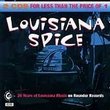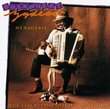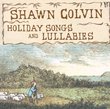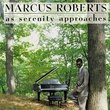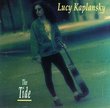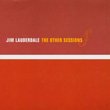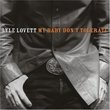| All Artists: Bruce Hornsby;Jack Dejohnette; Christian McBride Title: Camp Meeting Members Wishing: 3 Total Copies: 0 Label: Sony Legacy Original Release Date: 1/1/2007 Re-Release Date: 8/7/2007 Genres: Jazz, Pop, Rock Styles: Modern Postbebop, Bebop Number of Discs: 1 SwapaCD Credits: 1 UPC: 886970966320 |
Search - Bruce Hornsby;Jack Dejohnette; Christian McBride :: Camp Meeting
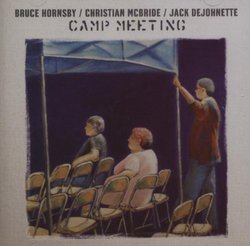 | Bruce Hornsby;Jack Dejohnette; Christian McBride Camp Meeting Genres: Jazz, Pop, Rock
Who knew that pianist/composer Bruce Hornsby, the popsmith of the hit "The Way it Is" and the bluegrass collaborator with Ricky Skaggs, was a jazz sleeper agent since his college days? On this 11-track recording, Hornsby's... more » |
Larger Image |
CD DetailsSynopsis
Amazon.com Who knew that pianist/composer Bruce Hornsby, the popsmith of the hit "The Way it Is" and the bluegrass collaborator with Ricky Skaggs, was a jazz sleeper agent since his college days? On this 11-track recording, Hornsby's "Bill Evans-meets-the-hymnbook" pianism is buoyed by Christian McBride's brotherly-loving bass lines and Jack DeJohnette's Big Easy/Windy City drumming. Check out the light-speed lyricism he lays down on the previously unrecorded Ornette Coleman number "Questions and Answers," the drum 'n' bass rendition of Coltrane's "Giant Steps," and the Meters-motored take on Miles Davis's "Solar." Keith Jarrett's ballad "Death and a Flower" is played with reverence and restraint, and the downbeats on Thelonious Monk's "Straight, No Chaser" and Bud Powell's "Celia" and "Un Poco Loco" don?t do injustice to their bebop roots. Hornsby keeps it rhythmically real, and he's given us a true sound of surprise. --Eugene Holley, Jr. Similarly Requested CDs
|
CD ReviewsThis ain't no Businessman's Bounce Jim Newsom | Norfolk, VA | 08/13/2007 (5 out of 5 stars) "When Bruce Hornsby called early last summer, he was jazzed about a recent set of recording sessions at his home studio in Williamsburg. "I just made a record with Jack DeJohnette and Christian McBride," he said. "It's really good; it's really rippin' man!" He played me some rough mixes a month later and it was clear right away that this was not our parents' jazz. Now, as the album comes out this week, it is also clear that Bruce Hornsby is one distinctive pianist no matter the surroundings. While this jazz piano trio setting may push him in ways his other outings haven't, he's still got that lyrical, richly chorded sound that is so readily identifiable. He calls it "Bill Evans-meets-the-hymnbook." Camp Meeting opens bravely with what is probably its least accessible cut, a previously unreleased Ornette Coleman tune called "Questions and Answers" that asks more than it answers, conjuring up memories of those 1970s Impulse! forays into outer harmonics. "We're playing some real tempos here," Bruce told me. "It's not just businessman's bounce." On "Charlie, Woody and You," he takes a Charles Ives etude, stretches it out rhythmically, and places it atop a funky bassline that brings to mind Charlie Haden's on Keith Jarrett's Fort Yawuh album. Jarrett gets a more obvious nod on Hornsby and bassist McBride's quiet duo reading of his `70s ballad, "Death and the Flower." It is simply beautiful. Miles Davis' "Solar" receives the full Hornsby treatment, with Copland-esque chords and roaming right hand explorations of all its improvisational possibilities. John Coltrane's "Giant Steps" is built on a scratchy drum-and-high-hat loop (that recurs unexpectedly elsewhere on the disc), letting out all the stops as legendary giant DeJohnnette drives the beat against the sampled percussion. Monk's "Staight No Chaser" is a second line march down Bourbon Street with Professor Longhair juiced on Thelonious punch. Bud Powell's "Un Poco Loco" has a phat bottom and a pounding pulse, while the standard "We'll Be Together Again" is as close to a straightforward tribute to Bill Evans as we are likely to get from the ever adventurous Williamsburger. "Celia" bounces along in a mid-tempo groove pocked with occasional Cecil Taylor-like detours to the edge and back. Bruce's original material draws from the same wellsprings as his pop and rock songs. You'll recognize lines and themes in the gospel-tinged title cut and spot a nod to his in-concert showcase "Spider Fingers" in the interestingly titled "Stacked Mary Possum." Listening to this magnificent CD, one can only wonder what took Bruce Hornsby so long to try his hand at "real jazz." "I've always considered myself to be a friend of jazz," he told his old friend Pat Metheny a few years back. (Metheny is executive producer of this record). "I know the language, but it's not what I do for a living, I'm not fluent in it." Camp Meeting reveals a pianist at home with, and quite fluent in, this music. I predict he'll receive at least two Grammy nominations next February: one in the Best Contemporary Bluegrass category for his collaboration with Ricky Skaggs that came out earlier this year; and one or more in Jazz for this CD. It is right up there with his best work. "I made this for the art of it," he told me last summer, "and I wanted to find my own way of doing it." He succeeded. copyright © 2007 Port Folio Weekly/Jim Newsom. All rights reserved. Used by Permission. Originally published in Port Folio Weekly - August 7, 2007" Bruce Finally Makes a Jazz Record Len Scaffidi | NC | 10/04/2007 (5 out of 5 stars) "Anyone who has followed the career of Bruce Hornsby knows he has the requisite chops, experience and education to be a top-flight jazz player. With the release of Camp Meeting, Hornsby demonstrates his prowess as a pianist, composer and band leader while paying homage to some of the jazz giants who came before him. Camp Meeting is a trio session with bassist Christian McBride and drummer Jack DeJohnette. Both are in top form, as usual; providing not simply accompaniment but conversation. Starting with a surprisingly accessible version of Ornette Coleman's Questions and Answers, Hornsby comes out of the chute with an interpretation focusing on the percussive and, of course, DeJohnette is up to the task. The next cut, titled Charlie, Woody and You is credited to Hornsby and Charles Ives as co-writers. The most "out" track on the CD, the title is an obvious reference to Dizzy Gillespie's composition Woody N' You - considered the first be-bop recording when released by Coleman Hawkins and later made famous by Miles Davis on the Relaxin' LP that would follow. The rest of the LP provides more of a mainstream groove, which in no way should be construed as denigration. Miles' Solar, Trane's Giant Steps, Monk's Straight No Chaser and three Bud Powell compositions all receive a respectful reworking that demonstrate Hornsby's inventiveness and the facility of his superb sidemen. The other original, Hornsby's Stacked Mary Possum holds its own among these classics and may very well become one in its own right after a generation of Berklee and Miami students learn it. Close friend and Miami alumnus Pat Metheny is credited as "De Facto Executive Producer" but the recording is self-produced by Hornsby and expertly engineered by Joe Ferla, who captures the acoustic instruments clearly and without any artificiality. I hope Camp Meeting is the beginning of a series of recordings that will show Bruce Hornsby to be a contemporary among the major jazz artists of his generation." Accomplished Jazz Foray for a Multi-Talented Musician Who Ha Ed Uyeshima | San Francisco, CA USA | 09/02/2007 (4 out of 5 stars) "The opening cut, Ornette Coleman's previously unrecorded "Questions and Answers" signals a liberating introduction to Bruce Hornsby's debut as a progressive jazz musician, the only common tie to his previous work being the expert musicianship he displays no matter what the musical genre. Along with bassist Christian McBride and drummer Jack Dejohnette, the Virginia-born musician provides fresh interpretations to compositions both old and new that blend seamlessly into a program that is both seductive and challenging. What all the tracks have in common is the meticulously clean sound Hornsby has made his trademark through the years. In fact, a more familiar Range-like sound can even be heard on Miles Davis' percolating "Solar", which features plenty of gymnastic piano playing capped by sharp solo turns by McBride and Dejohnette.
Keith Jarrett's "Death and the Flower" is given an appropriately melancholy treatment here, but Hornsby never completely gives into its funereal tone. Instead, he finds a sweet-spirited, melodic undercurrent that brings a lighter, Vince Guaraldi-like feeling than I imagine even Jarrett envisioned. Hornsby himself wrote several tracks including the free-form expression tribute that is "Charlie, Woody and You" and the title tune in which the trio moves effortlessly along a percussive swing beat. Electronica sound effects, a surprising aural touch here, infiltrate John Coltrane's "Giant Steps" but not to the composition's detriment as the fleet work of the trio, especially Hornsby's lightning-quick playing, commandeer easily over the techno rhythms. Hornsby's own "Stacked Mary Possum" is even more of an oddity, a rhythm-driven piece driven almost solely by his breakneck-paced playing. Several tracks spotlight the ensemble more evenly, such as their playing of Bud Powell's "Celia" which maintains a nice seductive pull. Another is "We'll Be Together", written by Carl Fischer and Frankie Laine, which has a solemn, dirge-like quality that the trio unravels about midway through and transforms into a more sauntering, midnight-hour piece. The trio gives due respect to Thelonious Monk's classic "Straight, No Chaser", though they seem more preoccupied with the rhythmic pace to be taken over completely by the improvisational nature of the composition itself. Hornsby fluidly blends his own "Chant Song" with Powell's "Un Poco Loco" in the percussion-punctuated final track. Unsurprisingly, Hornsby shows a sure hand in the jazz genre, something that was clear from his rolling piano interludes in his first pop hit, 1986's "The Way It Is" (from the album of the same name). What took him so long to realize this is anyone's guess, but this is a superb foray for an undeniably talented musician." |

 Track Listings (11) - Disc #1
Track Listings (11) - Disc #1